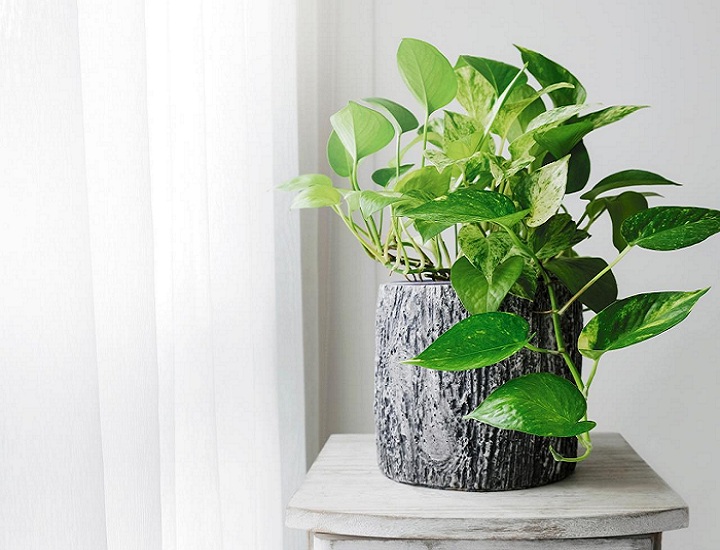It has been scientifically proven that these Pothos Plant Benefits are true! Certainly! You don’t even need sunlight to grow this low-maintenance plant!
Pothos is a low-maintenance plant that tolerates low light. There’s more! Recent research and studies confirm several Pothos Plant Benefits, making it one of the best houseplants.
Low-Maintenance Plant
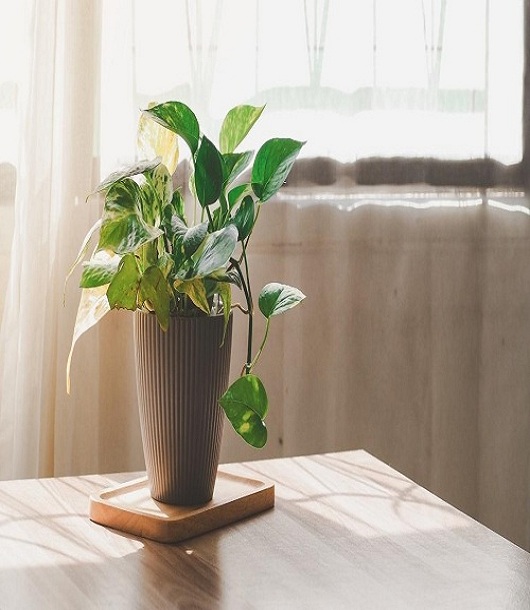
Low-care pothos thrives in a wide range of environments, including bright or shady light and moist or dry soil.
For optimal results, place it in strong indirect light and water just when the soil seems dry to the touch, although this isn’t necessary. When there isn’t much light, it will become less variegated.
Note: This study found that the golden Pothos plant can withstand drought.
Simple to propagate
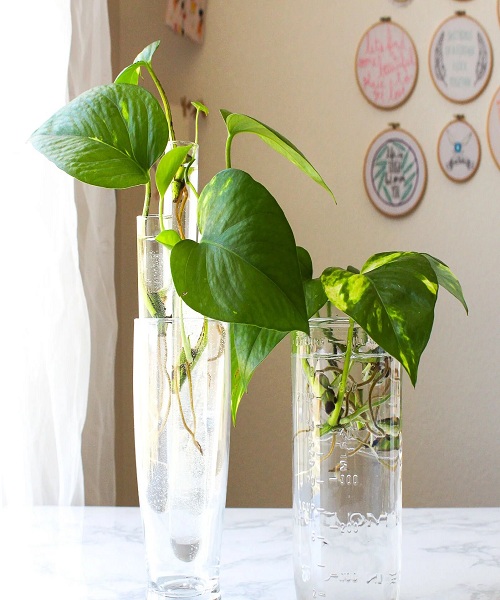
Compared to other houseplants, Pothos propagation is a breeze. All you have to do is take a cutting and remove the lowest leaves. The best way to keep it healthy is to keep it in fresh water. That’s all!
Can grow without Sunlight!
Even without direct sunlight, Pothos can thrive. Even in low light and drought-like conditions, this houseplant thrives in chilly temps. These plants will have less variegation and develop more slowly, but they will not die.
Note: The plant will not be able to survive in a completely dark room even if there is no sunshine. It will require bright and indirect lighting.
Improves the Quality of the Air in Your Home
Pothos has a remarkable ability to purify the air around it of harmful VOCs and other pollutants. Air pollutants like benzene, toluene, formaldehyde, carbon monoxide, and xylene are removed by this plant according to NASA’s clean-air research.
The negative effect of these pollutants cannot be neglected, and here’s how they hurt us:
Benzene: Tobacco smoke, vehicle exhausts, petrol stations, and industrial pollution are all sources of benzene exposure. Even things that don’t seem dangerous, like paints, glues, detergents, and furniture wax, can raise the amount of benzene in the air inside. When exposed to benzene, the cells in the bone marrow are damaged, which can lead to anemia.
Our immune systems are weakened as a result of long-term exposure to benzene, making us more vulnerable to illness and disease.
Formaldehyde: Formaldehyde exposure is caused by pressed wood products, carpets, cigarette smoke, and the use of appliances like wood stoves, kerosene heaters, and gas stoves without vents. Short-term exposure can cause watery eyes, a burning sensation in the nose, eyes, and throat. According to the National Cancer Institute, it can potentially cause cancer and leukemia.
Carbon monoxide: Carbon monoxide levels in indoor places rise mostly as a result of gas heaters, wood fires, clogged chimneys, blocked vents, and some electrical appliances. Infants, unborn children, and the elderly are particularly vulnerable. If you suffer from a chronic illness, respiratory issues, or anemia, CO exposure can have a greater impact on you than on a healthy individual. CO gas causes vomiting, headaches, nausea, and dizziness. Even unconsciousness and death can result from excessive CO concentrations in the surrounding air.
Xylene: Xylene can be found in a wide range of everyday and industrial products, including adhesives, gasoline, nail paint and varnish, and many others. When breathed, it affects the central nervous system and can produce vomiting, nausea, dizziness, and a severe headache. The effects grow more pronounced and potentially fatal as the frequency and duration of exposure rise.
Toluene: The evaporation of toluene from paint thinners, paints, gasoline, and nail polish increases its concentration in the indoor environment. Toluene affects the central nervous system. If you are exposed to it for a short time, you might get headaches, feel dizzy, or even pass out. Toluene has major side effects, including memory loss, incoordination, and the eventual loss of both eyesight and hearing if exposed for an extended period of time.
Pothos is capable of effectively removing formaldehyde and other VOCs.
Raises Humidity
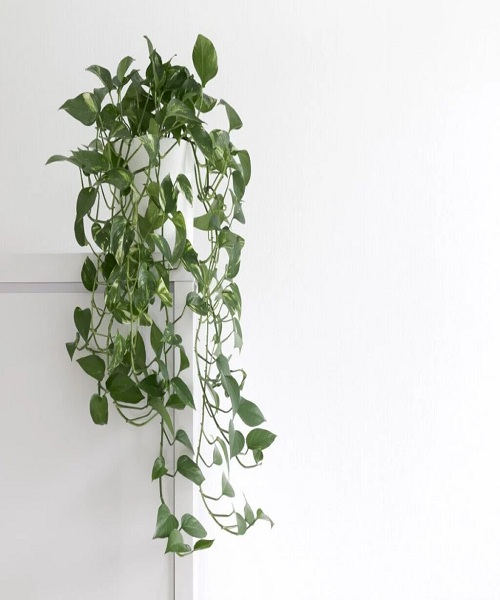
Because viruses can’t spread as easily in moist air, humidity can help keep you healthy by keeping your nose and throat moist. It can also help keep your skin hydrated. Dry air, on the other hand, amplifies allergy reactions as well as the spread of dust and other airborne contaminants. Because of these numerous advantages, it’s comforting to know that the pothos plant can also improve the humidity in its immediate surroundings.
However, there is no adequate research to indicate how many of these plants you need per room for this purpose, but the NASA experiment discovered that golden pothos is one of the plants that improve humidity.
It looks fantastic!
This is a no-brainer! Unlike many other trailing plants, Pothos may be trained to grow on just about anything. This houseplant’s unique feature is that you can have it trailing or ascending, depending on your preference. While other houseplants lose their color in the absence of sunlight, this one retains its vibrant hue.
The waxy surface of the heart-shaped, vivid yellow and green variegated leaves makes them very eye-catching.
A Versatile Plant
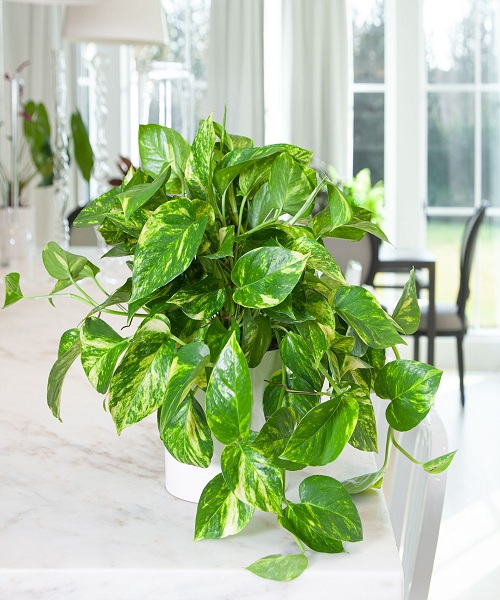
Pothos is an ornamental plant that can be trained to grow in any way you like. Hang it from the window, or place it on a shelf, office desk, table, or kitchen countertop, with the stems cascading downwards.
Additionally, you can train it in any shape you like.
Plant for Good Luck
According to Feng Shui, there are numerous benefits to placing golden pothos in your home. Why? Because feng shui experts believe that it is an energetic force that purifies the bad energy.
It’s best to keep the pothos near a router, computer, or TV with WiFi. Some of the possible benefits include lower stress and better quality of sleep.
According to Vastu beliefs, this plant is a good luck charm and a source of positive energy for homes. Although Vastu adherents do not suggest planting in the garden.
It’s Not Easy to Kill!
The common houseplant is known by a slew of unusual names. One of them is Devil’s Ivy, which is difficult to kill. Furthermore, some people regard it as a weed.
It’s also known as the “Money Plant” in several nations because of the notion that cultivating it will make you rich and ensure that you’ll never run out of money.
Relaxing Effect
A study of 14 Japanese men discovered that the mind is calmed and serene by touching the leaves of golden Pothos.
Captures CO2 and Ozone
According to a Malaysian study, one of the major health benefits of the Pothos plant is that it is an efficient CO2 absorber.
Snake plants, spider plants, and Pothos, three common houseplants, were studied to see if they might absorb ozone, a frequent indoor air pollutant.

